
In recent months, the normally bustling Kambri precinct at the ANU was much quieter than usual. Photo: Michelle Kroll.
The Federal Government’s announcement that fully vaccinated international students, eligible visa holders and travellers from Japan and South Korea can travel to Australia from next week has been welcomed by Chief Minister Andrew Barr and two of the ACT’s major universities.
Prime Minister Scott Morrison yesterday (22 November) confirmed the arrangements, saying it marked “a major milestone in our pathway. It’s a major milestone about what Australians have been able to achieve and enable us to do”.
Vaccinated international students with a valid visa will no longer need an exemption to travel to Australia, but they will be subject to the quarantine arrangements of the state or territory they are travelling to.
Fully vaccinated means a person must have received a full course of one of the six TGA-recognised COVID-19 vaccines, the three being administered in Australia – Pfizer, AstraZeneca and Moderna – as well as the Johnson & Johnson (Janssen) vaccine, Coronavac (Sinovac; predominantly used in China) and Covishield (predominantly used in India).
It’s not yet known if international student visas will be extended to make up for the time they were locked out.
Upon learning of the announcement, Mr Barr said it was good to finally have confirmation from the Federal Government on this matter.
“The return of international students will further support our economic recovery, which is already well underway,” he said.
“It will help create jobs in our local tertiary education sector and assist in addressing labour shortages in industries such as hospitality, tourism and retail.”
According to the Chief Minister, international education contributes more than $1 billion annually to the ACT economy.

Chief Minister Andrew Barr previously said the return of International students would help kickstart the Territory’s economic recovery. Photo: Michelle Kroll.
For almost two years, international students and other groups have been locked out of the country or forced to quarantine on their arrival as international borders closed due to COVID-19. Both UC and the ANU have pushed governments for concrete plans to bring international students back to campus.
UC Vice-Chancellor Professor Paddy Nixon said the university had been working closely with the ACT and Federal governments on a plan to bring international students back to campus for 2022, but it was cancelled due to Sydney’s delta outbreak.
He said all international students have been missed over the last two years, and the community is excited to welcome them back to Canberra and to campus.
He added that the hundreds of existing students overseas would be the university’s “priority”.
A spokesperson for the ANU echoed Professor Nixon’s sentiments.
They said the Federal Government’s commitment to open borders to international students is an important step toward bringing students back home to Canberra.
“We’ve missed them and they’ve missed us. They want to get back to ANU and we can’t wait to welcome them back as soon as we can safely can,” the spokesperson said.
“We will work with the government to give them the information they need, including around sufficient resourcing, to be ready to administer the relevant visa processes,” they said.
ANU Vice-Chancellor Brian Schmidt told ABC Radio yesterday that Australia’s regional influence could wane if there is not a good rebound in the number of international students coming to the country.





















